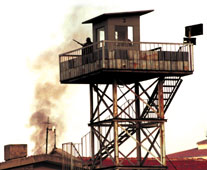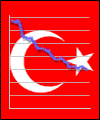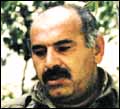17
April 2001
![]()
2. "Turkey's glimmer of hope",
Kemal Dervis offers hopes of genuine reform.
3. "Turkey expresses concern over worsening Middle
East conflict", Turkey said Monday it was very concerned
by the escalating Middle East conflict following Israeli air strikes
on Syrian targets in Lebanon.
4. "Turkey's defense industry suffering amid crisis",
Turkey's defense industry is downsizing amid the nation's fiscal crisis.
5. "The alternative is new elections",
Ocalan said that they did not agree with the talk of the government
resigning and interim regimes, and said that it was necessary to go
to elections and renew the existing parliament in order to pull out
of the crisis. Ocalan stressed that the Kurdish people were ready to
play a leading role.
6. "Turkey, Syria to sign military cooperation
deal", Gen. Resat Turgut in Damascus for military talks.
1. - BBC - "Thirteenth Turkish hunger striker
dies":
Another prisoner on hunger strike in Turkey is reported to have died
- the 11th inmate to die in the current protest. 
Two relatives who joined the hunger strike have also died.
The Turkish Human Rights Association said that the latest prisoner to
die, Sedat Gursel Akmaz, died in the coastal city of Izmir.
The organisation said he had not eaten solid food for 151 days.
The prisoners are resisting moves to transfer them from their present
domitory cells to smaller, individual ones where, they say, they would
be subjected to abuse by the prison authorities.
But Turkish prison officials say the transfers are necessary to break
up militant groups. ![]()
2. - BBC - "Turkey's glimmer of hope":
Kemal Dervis offers hopes of genuine reform
Turkey's struggle to overhaul its creaking economy took
a decisive turn at the weekend.
Economy minister Kemal Dervis unveiled details of his new economic programme
on Saturday and promised a break with the half-hearted reforms of the
past.
He announced plans to cut public spending by almost 10%, to decrease
Turkey's national debt, to overhaul the country's weak banking system
and to speed up its privatisation programme.
On Monday, the Turkish stock markets reacted positively, closing up
about 5%.
Mr Dervis' programme is designed to win foreign funding and traders
are optimistic that it will tempt investors back into the market.
"This program is different from those which preceded it, because
instead of attacking short-term problems, it takes on structural aspects
of the Turkish economy," said Tevfik Eraslan, a capital markets
fund manager at Kentbank.
Industrial support 
Leading industrialists have also praised the new programme of reforms.
Ishak Alaton, head of Alarko, an air-conditioning, heading and refrigeration
group, said the measures would benefit the private sector.
"We must put an end to this communist, Stalinist system from the
1950s," he said.
But Mr Dervis, himself, has shown more caution. He has told local newspapers
that the structural overhaul would take time to bear fruit.
"To win confidence at home and abroad, the programme must be carried
out in a determined and serious fashion," he said.
Foreign aid
To help support his plan, Mr Dervis hopes to win $10-12bn in foreign
loans this week.
The International Monetary Fund is discussing possible funding with
Turkey and has suggested that it would release $6.5bn left over from
a previous IMF-backed programme.
In turn, the World Bank, which has publicly welcomed Mr Dervis' programme,
may provide $5bn.
Mr Dervis has also appealed to the Group of Seven major industrial powers
for financial assistance.
Autonomy for the central bank
In addition, Turkey's parliament began considering a draft law on Monday
to increase the independence of the country's central bank.
The new law would prevent the bank from bailing out loss-making state
companies and providing unsecured credit to the Treasury.
The bank's more autonomous role is a central feature of Mr Dervis' reform
programme.
In future, the bank would also be more transparent and would require
independent audits of its balance sheet.
Street protests
Mr Dervis' new programme has proved less popular with trade unions and
the Turkish people at large.
Tens of thousands of people took to the streets last week to protest
at the government's handling of the crisis, which has cost mass job
cuts.
The release of the new economic programme follows a financial crisis
in February, which forced the government to devalue the currency.
The spectacular devaluation of the currency, which has since lost almost
40% of its value, was triggered by the mass exodus of foreign investors.
The devaluation also derailed a previous economic programme backed by
$11bn in IMF loans.![]()
3. - AFP - "Turkey expresses concern over worsening
Middle East conflict":
ANKARA
Turkey said Monday it was very concerned by the escalating Middle East
conflict following Israeli air strikes on Syrian targets in Lebanon.
"The Israeli attacks in the Shebaa Farms sector show the precarious
state of the security situation and stability in the region," a
foreign ministry statement said. Turkey condemned all acts of violence
and appealed to both sides to resolve their differences by negotiation.
Syria has promised revenge against Israel for the air raid on a Syrian
military position in Lebanon which killed at least one soldier and injured
four others.
A Syrian radar station and anti-aircraft defence system were bombarded
at Dhar al Baydar, near the Syrian border early Monday. The Israeli
bombardment came in retaliation for the radical Lebanese Shiite Hezbollah
movement's killing Saturday of an Israeli soldier in the Shebaa Farms,
a disputed border territory with Israel. Syria, the main power broker
in Lebanon, is seen as Hezbollah's chief sponsor along with Iran. ![]()
4. - Middle East Newsline - "Turkey's defense
industry suffering amid crisis":
ANKARA 
Turkey's defense industry is downsizing amid the nation's fiscal
crisis.
Officials said the fiscal crisis has halted the growth of Turkey's defense
industry. This has continued a process of significant layoffs and the
idling of assembly lines.
At this point, officials said, the defense industry has been reduced
from 21,600 to 13,000 employees. The layoffs were reported as Turkey's
military reported the suspension of 32 military projects.
Officials said the military's decision marks another blow for the defense
industry. Turkey's leading companies had planned for major offset agreements
as part of Ankara's expected purchase of Western defense systems. ![]()
5. - Kurdish Observer - "The alternative is new
elections":
Ocalan said that they did not agree with the talk of the government
resigning and interim regimes, and said that it was necessary to go
to elections and renew the existing parliament in order to pull out
of the crisis. Ocalan stressed that the Kurdish people were ready to
play a leading role.
PKK Council of Leaders member Osman Ocalan said that early
elections were needed for Turkey to pull out of the economic crisis.
Speaking by telephone on the Kurdish-language Rews program on MEDYA-TV
the other evening, Ocalan discussed the economic crisis and the way
out, interim regimes, the merchant class demonstrations, creation of
a peaceful environment in South [Iraqi] Kurdistan, and separations from
the party.
Ocalan said it was necessary to view the current crisis in Turkey as the "collapse of the oligarchic system" and continued to say: "Today's situation resembles the 'sick man' description of the Ottomans in their last days. There are two paths to be saved from sickness; the current parliament must be renewed. There must be new elections. This parliament is a war parliament and cannot develop democracy." Ocalan said that they did not agree with the talk of the government resigning, and said the following: "If this government resigns, who will come in its place? The DYP who brought politics of plunder with perpetrator unknown [murders]? Or Fazilet? The Grand Unity Party takes the same line. That's why those who brought the merchant class out onto the streets are saying 'Let this government go, let us come.' Instead of the government resigning, let the path to new elections be opened. The current demonstrations resemble the Janissary revolts. Let them voice their demands within the Labor Platform."
Concerning the debates on military intervention and interim regimes that certain circles are trying to bring onto the agenda, Ocalan said, "Even if there is an interim regime, it will last a year at the most and Turkey will not be able to pull itself together again. Military intervention would accelerate dispersion and disintegration. Even the merchant class, the basic support of the oligarchic system, is rising up. That's why the oligarchic republic cannot live much longer. The democratic front would prevent the disintegration of Turkey and secure development. Turkey doesn't have another choice."
Kurds are ready for leadership
Ocalan pointed out that just as they played a fundamental role in the establishment of the Republic of Turkey, the Kurds today are ready to save the republic from economic crisis and for its democratization, continuing to say the following: "The Kurds are ready to take a role of leadership. Today, there are three million Kurds who have been pushed off their land. If their return is secured, they will have jobs, they will participate in production, and will make an important contribution to Turkey's economy. If they had carried out an economic campaign instead of looking for foreign capital, it would have been an important contribution to coming out of crisis."
The conditions for solution have developed
Ocalan evaluated the withdrawal of the Turkish army from South Kurdistan as "a gain for peace." Speaking on the subject of peace between the Kurds, Ocalan said, "We could say that the Ankara and Washington processes have died... There has not yet been an alliance formed between the KDP and the PUK and between the PKK and the other two organizations. But their is no atmosphere of war. Everyone has seen that domestic war brings benefit to no one. We therefore are saying let's make a beginning. Everyone can apologize to the people for the faults that sprang from themselves because of internal war."
Those who left us may return
Finally, Ocalan called to all the people who have fallen away from the party, no matter what the reason, saying: "Our party is ready to embrace everyone. I am calling to a struggle based on peace, democracy and unity. These are the demands of history and that were expressed in Diyarbakir at Newroz."
Members of the Kurdistan National Congress Ahmet Aktas and Musa Kaval were studio guests on the Rews program.
They must not just stand by and watch death
PKK Council of Leaders member Osman Ocalan has made important statements concerning the death fasts. Ocalan had the following to say on the subject: "There is a human drama in the dungeons. We said from the beginning that it was not right for the hunger strike to go on this long. The Turkish left was stubborn on this. They were unaware of developments on the outside. Despite this, we are respectful of this resistance. They must not stand by and watch humanity die. Everyone great and small absolutely must do something to protect their lives. We want the state to drop this stubbornness also. Otherwise, Turkey cannot get out from under this. Softness and flexibility do not make a state smaller, on the contrary, makes it greater."
No to poverty and corruption
Tens of thousands of laborers participated in the demonstrations in Turkey and Kurdistan arranged by the Labor Platform and protested the government, gangs, poverty and corruption. HADEP added strength to the protests.
While the largest of the demonstrations held in various provinces of Turkey and Kurdistan was in Istanbul, there was also heavy participation in Adana, Mersin, and Bingol. As for Ankara, a statement to the press was made at Guven Park.
Heavy participation
The Istanbul demonstration was held in Sisli's Freedom Monument Square and participated in by the 15 organizations that make up the Istanbul Labor Platform - including unions Turk-Is, Hak-Is, DISK, KESK, Turkey Public Workers' Union, and Civil Servants' Union, the Union of Chambers of Architects and Engineers, and the Turkish Physicians' Union - as well as political parties, including the People's Democracy Party (HADEP).
Over 30,000 workers participated in the meeting, held with the slogan "No to poverty and corruption." Participants in the meeting were searched at five separate search points at Sisli, Mecidiyekoy, Caglayan, Okmeydani, and Perpa before they could enter the meeting square. During this, police used force against close ones of prisoners who were carrying signs in protest of F-type prisons and their signs were confiscated. After passing through the control points, the demonstrators marched in two separate corteges towards the square, chanting, "Let laborers, not gangs, rule."
The group on Piyalepasa Boulevard included DISK, KESK, HADEP, EMEP and nongovernmental organizations. That on Kagithane Avenue included Turk-Is, Hak-Is, Kamu-Sen, Memur-Sen, ODP and IP, and those in front carried a banner saying "No to poverty and corruption - the Labor Platform Istanbul Composite." Turk-Is chairman Bayram Meral and the members of the committee that arranged the meeting marched behind the banner.
Journalists also in the square
Both groups met up about 11:40 in the Freedom Monument Square. The meeting ended at about 12:30 after speeches and reading of a declaration.
Meanwhile, members of the Journalists' Assembly, comprised of journalists who have lost their jobs, marched to the meeting square with the first group shouting, "End the carnage of journalists", "End the carnage of workers", "A free press cannot be silenced", and "Metin's never die."
People in blood, OYAK in profit
Despite the economic crisis being experienced in Turkey, nothing at all happens to them. While the people are sweating blood just for a piece of bread, they are earning profit after profit. There is no arm of business they have not entered, from automotive to cement. It's name, for short, is OYAK.
OYAK (the Army Assistance Association), a giant economic
extension of the Turkish Armed Forces, met for its 41st Regular General
Board at the General Directorate Briefing Hall. ![]()
6. - Turkish Daily News - "Turkey, Syria to sign
military cooperation deal":
Gen. Resat Turgut in Damascus for military talks
ANKARA
As a result of the continuing mutual military visits between Ankara
and Damascus, Turkey and Syria are to sign a military cooperation agreement,
a top Syrian official in Ankara said.
Syria's ambassador in Ankara, Dr. Said Al-Bunni, said to the Turkish
Daily News that the two countries will pave the way for a cooperation
agreement between their armies in the near future. Gen. Resat Turgut,
head of the Plans and Principles Department, left for Damascus on Sunday
to meet with Syrian military officials, Bunni said.
Gen. Mahmoud Ammar, director of the political department of the Syrian
army came to Ankara in January and was received by General Yasar Buyukanit
and the commander of gendarmerie forces. Turkey proposed Syria to cooperate
in the field of defense industry as well, diplomatic sources said.
Turkish-Syrian relations have gone through a term of crisis for 15 years
as a result of the Syrian support to the outlawed Kurdistan Workers
Party (PKK) between 1984 and 1999. Abdullah Ocalan, the imprisoned leader
of the PKK, has been provided shelter in Damascus.
Ankara's efforts to persuade Damascus to give up supporting the PKK
resulted in Syrian officials responding that Syria had never sheltered
Ocalan. However as a result of the controlled escalation policy followed
by Ankara against Syria, which started with a speech made by the then
land forces commander Atilla Ates in Hatay, Ocalan left Damascus and
his "adventure" ground to a halt on Imrali prison island.
The Adana Agreement signed between Syrian and Turkish military officials
was the most important part of the softening process between the two
countries. Syrian Ambassador Said al-Bunni said the PKK issue was over
the two countries and it was no longer a shadow over bilateral relations
anymore. Despite the words of the Syrian envoy, Ankara still expects
Damascus to take further steps. Syrian banks reportedly still hold money
which was alleged to belong to the terrorist organization. On the other
hand, parallel to the ongoing military contacts, security matters will
be debated between the countries on different grounds, as well. Interior
Minister Saadettin Tantan will visit Damascus in May. ![]()